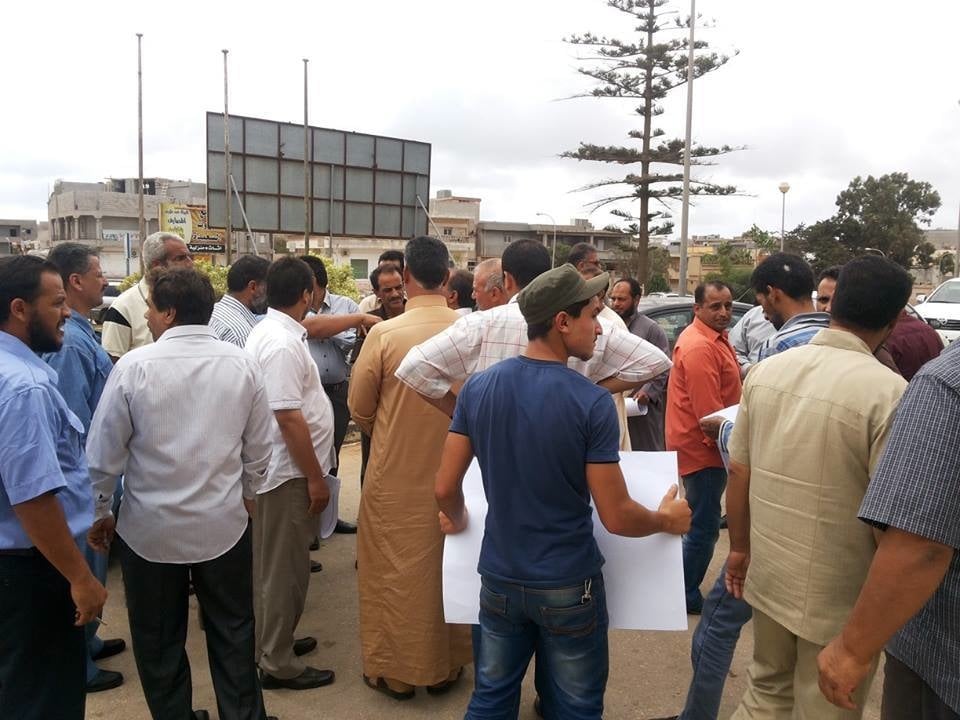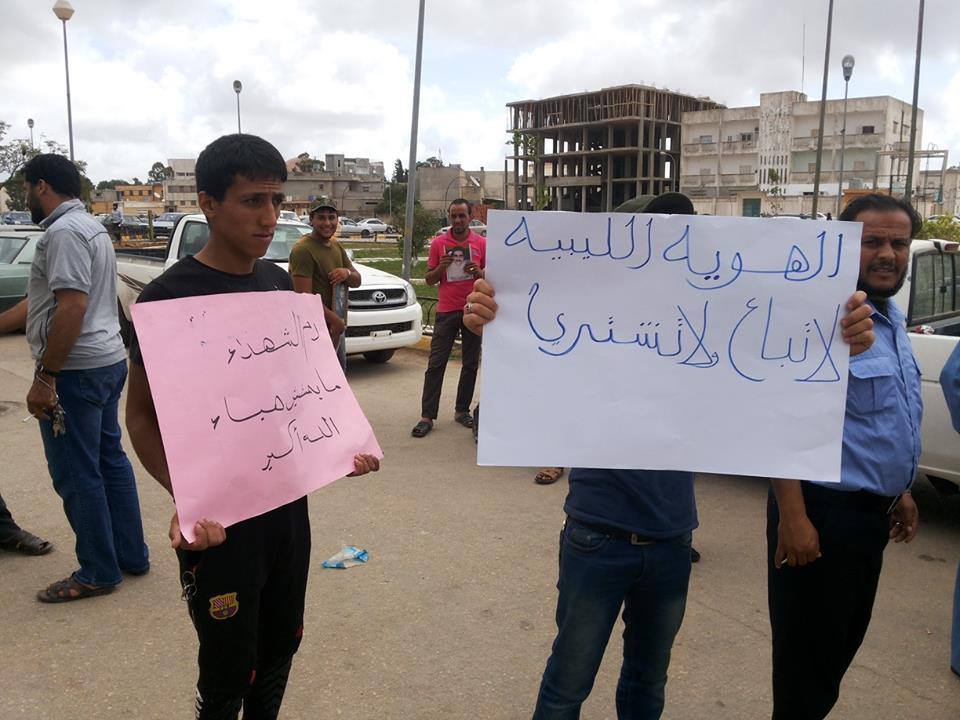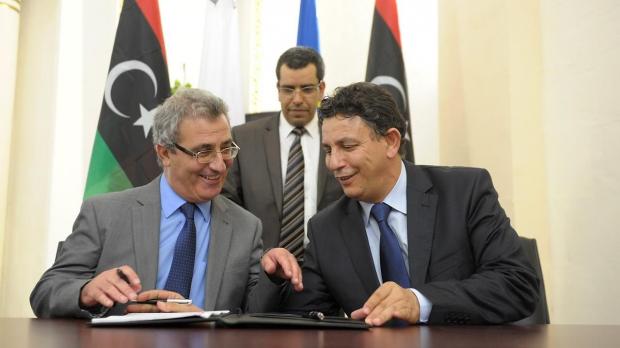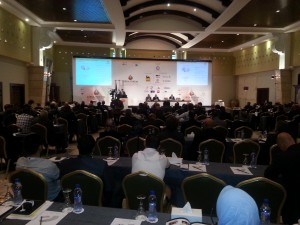By Mathieu Galtier.
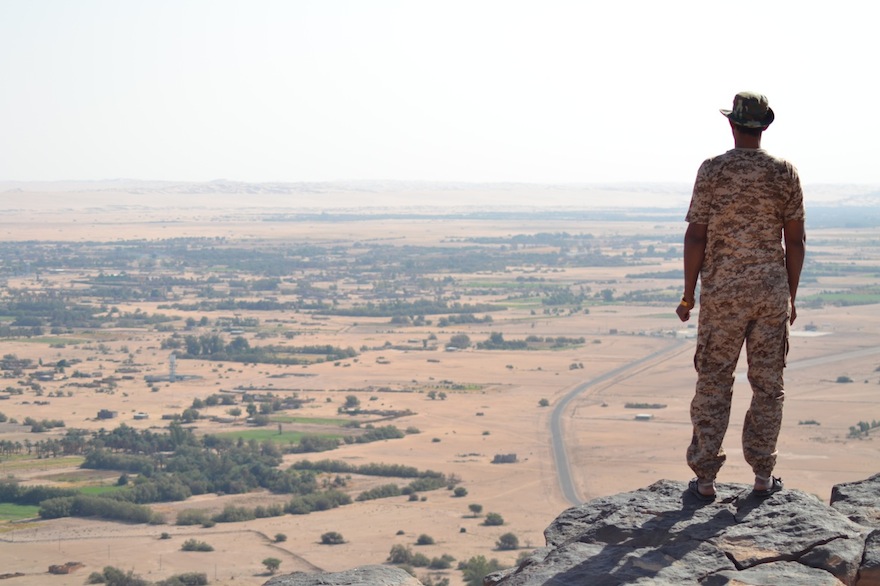
Looking south in Obari (Photo: Mathieu Galtier)
Sebha, 20 September 2013:
Standing under the shade of a large sign in front of the
Fezzan Hotel,
the only one still working in Sebha, capital of Fezzan, Marc (not his
real name) lists all the adventures he passed through to travel from
Guinea to Libya: the struggle to save the money, the sad good-byes to
his family, the thirst which forced him to drink in the same pond as
camels – and other miseries besides.
What about crossing the
borders between Niger and Libya? “Nothing to say. We were four migrants
in the pick-up. We crossed the border at Madama (in Niger, near Tumu,
the Libyan official border crossing station). Nobody asked us for
official documents.”
General National Congress (GNC) officially declared most of South as a military zone and voted to
close
Libya’s southern borders on 17 December. On the ground, nothing has
changed. Basically, Libya’s southern border is controlled from Algeria
border to Western Niger border by Tuaregs and from Niger Eastern border
to a part of the Sudanese border, by Tebus. All in all it is about 2,500
kilometres.
600 illegal immigrants a day
“About 600
illegal immigrants cross the border every day. Tripoli authorities have
never come to visit the borders. We send requests for more materials:
new cars and new weapons but we have never received a reply”, explains
Colonel Barca, head of military security for Murzuk area, controlled by
the Tebus.
In August, a delegation of Tebus, Arabs from the south
and Tuaregs was in Niger to discuss efforts to control the border more
efficiently although neither the government not the GNC organised or
financed the meeting. A similar delegation us expected to go to Chad
soon. “For the first time, Tebus and Tuareg have decided to collaborate
at the borders. We will have a direct communication between Murzuk [the
main Tebu centre, 150 kilometres south-west of Sebha] and Obari [the
main Tuareg centre, 200 kilometres west from Sebha]”, Hamadi Abad, a
Tuareg delegate, explains with enthusiasm. Right now, both ethnic groups
organise themselves as they want in their “preserve”, as some put it.
Corruption among border guards?
Tebus
are controlling the longest part of the souther border. Eighteen armed
groups – the number of men is kept secret – keep in touch with each
other to control it. Colonel Barca explains: “We cannot check every car
that crosses the border. So I have decided to focus on three main
issues: drugs, alcohol and weapons.” The implication is that oil, food
and human smugglers are more or less free to make business and that
Tebus make money from the trade. “It is well-known that Tebus’ wealth
come from trafficking,” a prominent Sebha resident claims. “For example,
the locality of Umm Al-Aranib [about 95 km east from Murzuk] is used as
a storage place for smuggled goods”.
Colonel Barca admits some instances of corruption among border guards: “The government gives no wages to the
thuwars [revolutionnaries]. Only those who used to be policemen or soldiers get their salary.” As a feared and respected
chief,
Colonel Barca has been master of the border in the Murzuk area since
the revolution and he has no intention of giving up his key role. That
is possibly why he has never requested extra men from Tripoli to check
the border.
In comparison with Tebus, the Tuaregs do not appear as
well organised. The local council identifies nine official brigades in
Obari. Officially all are under the control of Ministry of Defence or
the Chief of Staff’s office.
The main one is named
Tenere (“desert” in the Tuareg language) katiba.
“We
are given the order to protect the pass of Anay [about 234 kilometres
south-west from Sebha]. I can assure you that no weapons, drugs or any
smugglers come through this point. But, I don’t know what is going on
and which brigade is in charge of the rest of the border. Sometimes, we
notice armed cars through field glasses, so we do a report,” Ahmed
Bilal, deputy leader of the katiba, explains.
What if, one day, they face heavily armed traffickers at the pass of Anay?
“I tell my men not to try to catch them if they are too strong”, Ahmed Bilal replies.
An Al-Qaeda camp between Ghat and Algeria
In
addition to smugglers, it is in Obari area that Islamists are said to
have sought asylum after the North Mali war. “I certify I saw Al-Qaeda
small camp of four to six picks-up in Isseyne, at the border between
Ghat and Algeria. It was before Ramadan. I made a report but the
authorities replied: ‘Don’t do anything. You don’t see it. You don’t
look at it!’,” Hassan Massafer, a member of Katiba 206 in Obari (the
only one composed of Tebus), says, angrily hitting his hand on the desk.
French
writer Samuel Laurent relates that Katiba 315 in Obari is used as a
“transit camp” for Islamists. He writes that the terrorists who
committed the deadly In Amenas attack across the border in Algeria in
January spent one night in the katiba building in his book
Sahelistan.
“It is lie!”, Mohamed Raadi Al-Ansari, the deputy dead of
Katiba
315, insists. “We have nothing to do with Islamists. Besides, we are
all former member of the army in the previous regime, so Islamists are
against us.” As proof, he invites journalists to the tour of the katiba
headquarters: an about barracks where an hangar stands in the middle.
Inside, three old 4×4 vehicles and a tarpaulin which reveals two 14-mm
“dushkas” (anti-aircraft machine guns), one RPG, one FN assault rifle,
seven kalashnikovs and a dozen of boxes of ammunition. “It’s not the
armoury of terrorists”, Al-Ansari says smiling.
Such a bareness of weapons in such an over-armed country appears quite surprising.
From others come different views.
“Don’t
trust the katiba. They are financed by Islamists. If you come back in
three months, be sure that all the young people you saw inside will be
gone to fight. They hide weapons in Machrouaa area in Obari”,
inhabitants warn.
The mysterious Katiba 315 in Ubari
Machrouaa
is a like a slum with tiny buildings with zinc roofs and small dirt
streets in which wires trail on the ground where barefoot children are
playing. “I don’t want to speak about Al-Qaeda but I can understand the
men who are leaving to fight. There is nothing here – not a proper
electricity network, no tap water, no hope”, Bubaker from Machrouaa sums
up.
The town is where Sheikh Ahmed Omar, head of Katiba 315, has his religious school.
“None
of the 500 members of the katiba leaves to fight in Syria or anywhere
else. We have all the official documents to prove that we follow the
rules of the government”, Sheik Ahmed Omar’s close friend says. The same
source assure that Sheikh Ahmed has no link with Mokhtar Belmokhtar,
military commander of Al-Qaeda for an Islamic Maghreb (AQIM).
Tuareg
civil authorities do not deny that Islamists could be in their
territory but they accuse Tripoli of using the argument in order not to
process their request to give Libya national ID numbers to 14,000 Tuareg
families.
For their part, Arabs in Sebha are convinced that Tebus
and Tuaregs use their control of the borders to allow fellow members of
their ethnic communities into Libya. They fear they could end up being a
minority in Fezzan. “We have no problem with Libyan Tuaregs and Tebus.
We are brothers. But the others from Niger or Chad were used by Qaddafi.
They are the smugglers and the traffickers”, Ayoub Zaroug, head of
Sebha Local Council, says.
“We have to create a force which will
be formed of Libyans from every tribe to control the border,” Abubakr
Ehwaili, an independent Congressman from Sebha, says. “At present there
are only Tebus and Tuaregs. It is not secure.”
